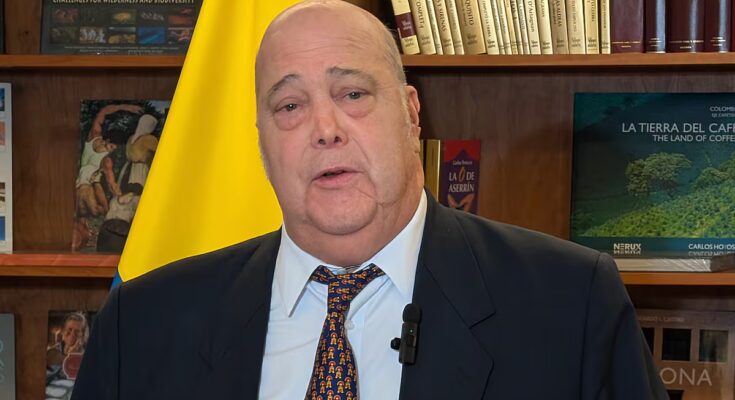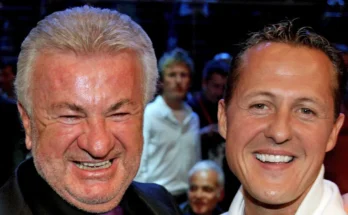A photo taken this Sunday at the White House has caused yet another diplomatic crisis between the government of Gustavo Petro and that of Donald Trump. Although it was broadcast on October 21 as part of official coverage of a meeting of senior officials with Republican senators, it only gained notoriety on Sunday morning when the magazine Edit published an article on a folder brought to the meeting by the deputy chief of staff, James Blair. There, among his papers, is an image of the Colombian president and his Venezuelan counterpart, Nicolás Maduro, in prison uniform. “The Trump Doctrine for Colombia and the Western Hemisphere,” reads the document, signed by Republican Senator Bernie Moreno. Petro responded Sunday evening with a call for consultations from his ambassador to Washington, Daniel García-Peña.
“If an ambassador is called for a consultation, the one acting for the other country returns to his country while receiving the relevant information. It is a question of knowing why on the official website of the White House they take me out as if I were a prisoner in a US prison. This is a brutal disrespect towards the people who elected me and the Colombian nation and its history,” he wrote in an explanation around midnight.
If an ambassador is called for consultation, the one representing the other country returns to his country while the relevant information is received. This is about knowing why on the official White House website they let me out as if I were a prisoner in an American prison. This is… https://t.co/sNTfd8YcMw
— Gustavo Petro (@petrogustavo) November 10, 2025
The news was initially given by the director of EditFederico Gomez Lara. “I just spoke to the president on the phone. He informs me that due to the revelation made today on the front page Edit will call Ambassador Daniel García-Peña for consultations and will ask for the expulsion of the US ambassador to Colombia, John McNamara,” writes the journalist in “I will ask García-Peña that Ambassador McNamara leaves Colombia”.
The folder held by Trump’s deputy chief of staff shows, in addition to the photo, a list of targets that make up “the Trump doctrine.” One of these is to “establish selective sanctions against Petro, his family and his associates”. It’s something that came to fruition three days later, when the Office of Foreign Assets Control (OFAC) included the president on a list of people linked to illegal activities. Another point is to “launch a thorough investigation into Petro’s campaigns and its foreign funding.” The remaining three are more general: they designate “other cartels” as terrorist organizations, support “pro-American leaders in the Western Hemisphere,” and “combat corrupt and anti-American criminal actions.”
Petro’s first reaction was to deny having ties to drug trafficking, as Trump himself recently claimed. “For the president of the United States to accept this kind of fake news (fake news) among his advisors, demonstrates the total lack of respect for the Colombian people,” he wrote in compliance with the rules of sovereignty and democracy,” he declared.
The Colombian president reiterated that the main person responsible for the ongoing tensions with Trump is Senator Moreno, born in Colombia and coming from a rich family of businessmen and politicians. According to Petro, the MP is trying to punish him for complaints made decades ago against his brothers for money laundering and land exploitation. “It is a family that wants to take revenge on the President of the Republic,” said the president in an act in which he apologized on behalf of the Colombian state to the victims of the genocide of the left-wing Patriotic Union party.
Moreno, for his part, has repeatedly expressed his support for former president Álvaro Uribe and insulted Petro. “FAFO”, he told her a few weeks ago, an acronym for the English expression Fuck it and find out (Get fooled and you’ll see).
The multiple crises
This new diplomatic crisis comes just three weeks after Trump described his Colombian counterpart as “a drug trafficking leader who promotes the mass production of drugs.” Then, Petro called his ambassador for consultations, while McNamara remained in Bogota. Conversations with the American diplomat, whom the left-wing president described as “a very decent person”, made it possible to ease the crisis. No new tariffs were introduced against Colombia, but the country was asked to achieve more in the fight against drug trafficking. Petro, for his part, assured that Trump receives incorrect information from some of his advisors and that “a way” must be found to reach him directly.
The new comparison and the one from three weeks ago are just two of a long list. In January, a few days after the Republican leader took office, tension increased after Petro’s decision to deny disembarkation to some American planes with deportees arriving in handcuffs. Trump threatened tariffs, Bogota promised reciprocal measures and in the end everything was avoided with negotiations between executives. In July, the United States withdrew its chargé d’affaires after Petro suggested that Secretary of State Marco Rubio was planning to overthrow him. Colombia responded with the same measure, but García-Peña eventually returned to Washington with an apology.


